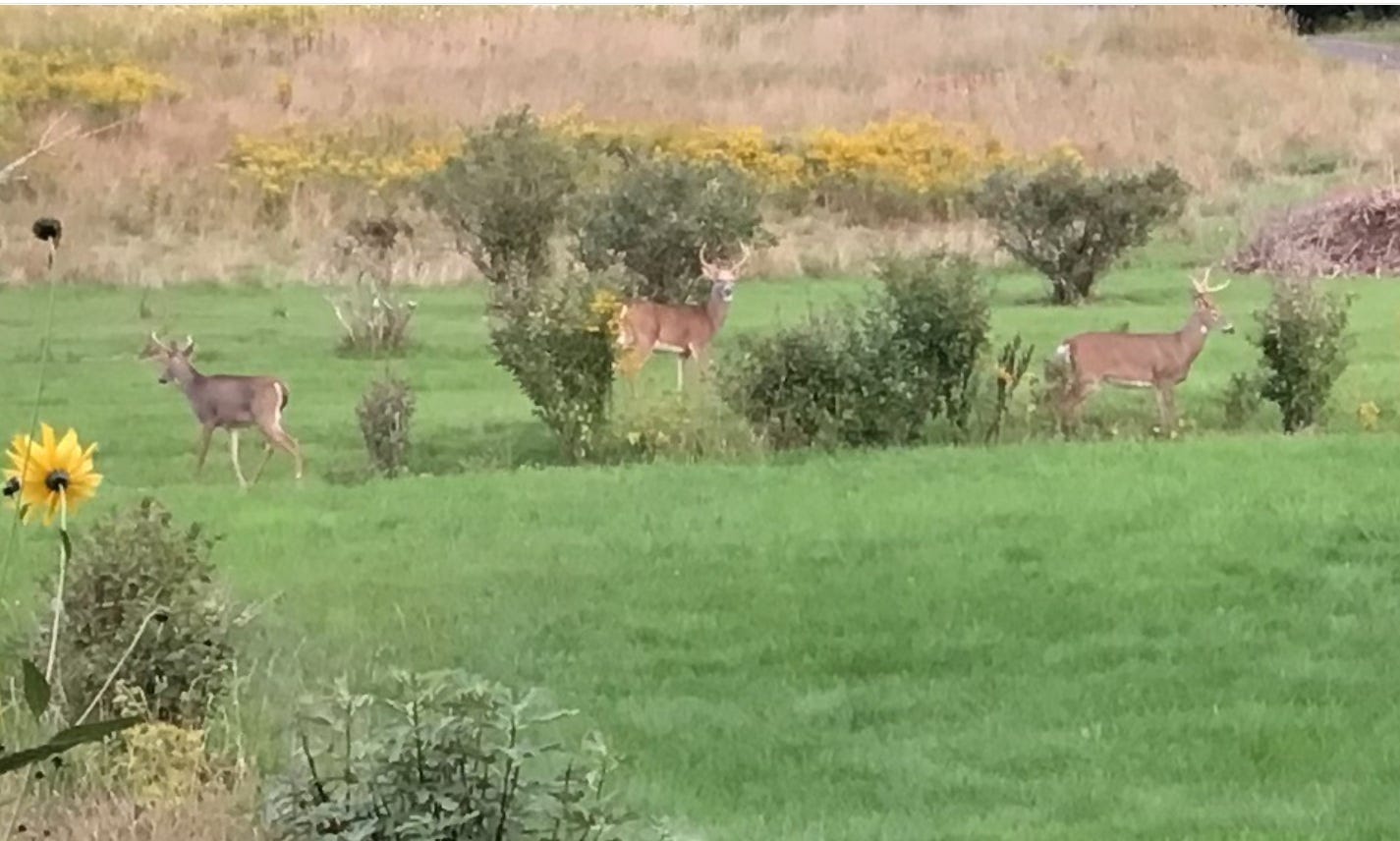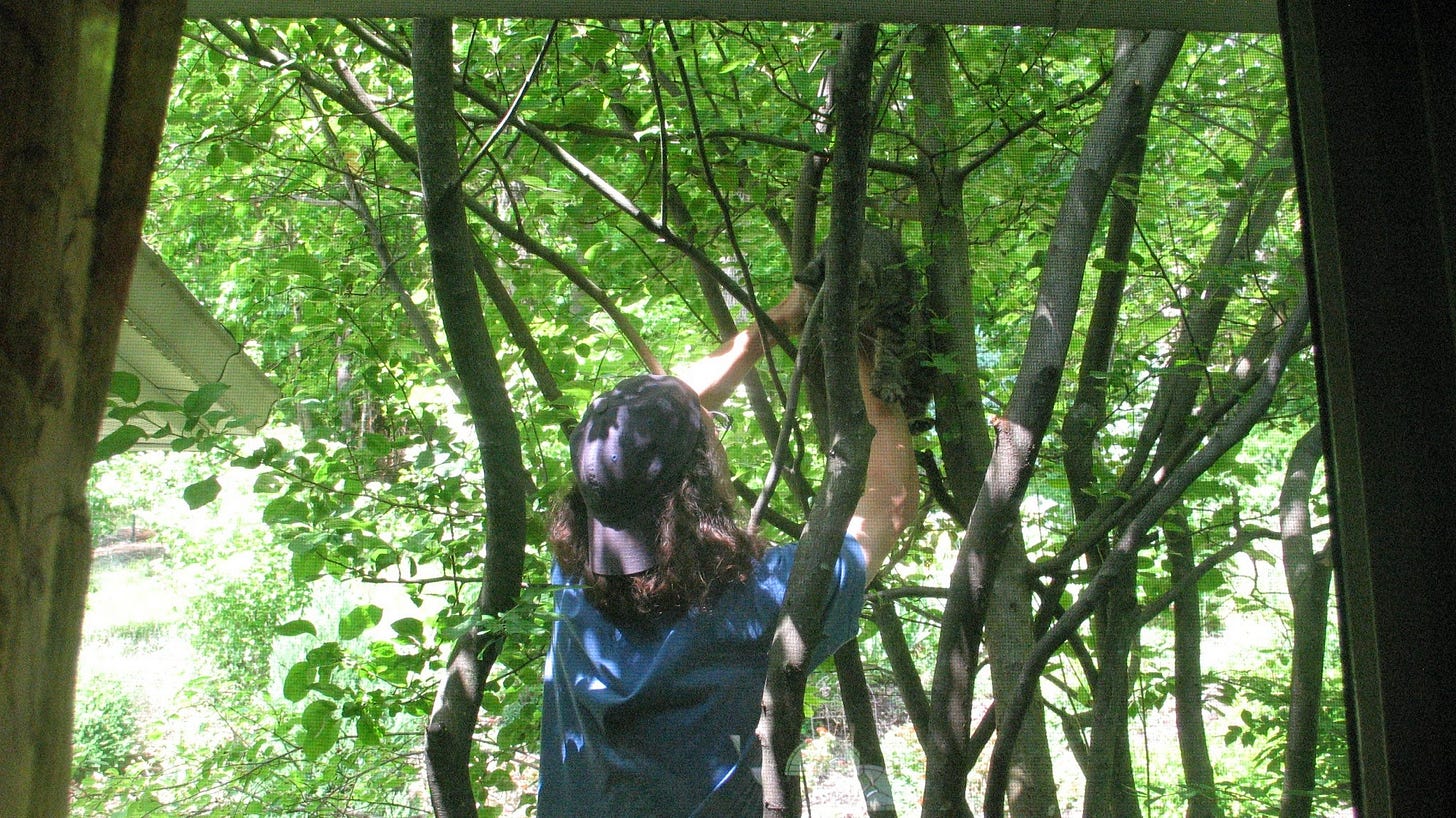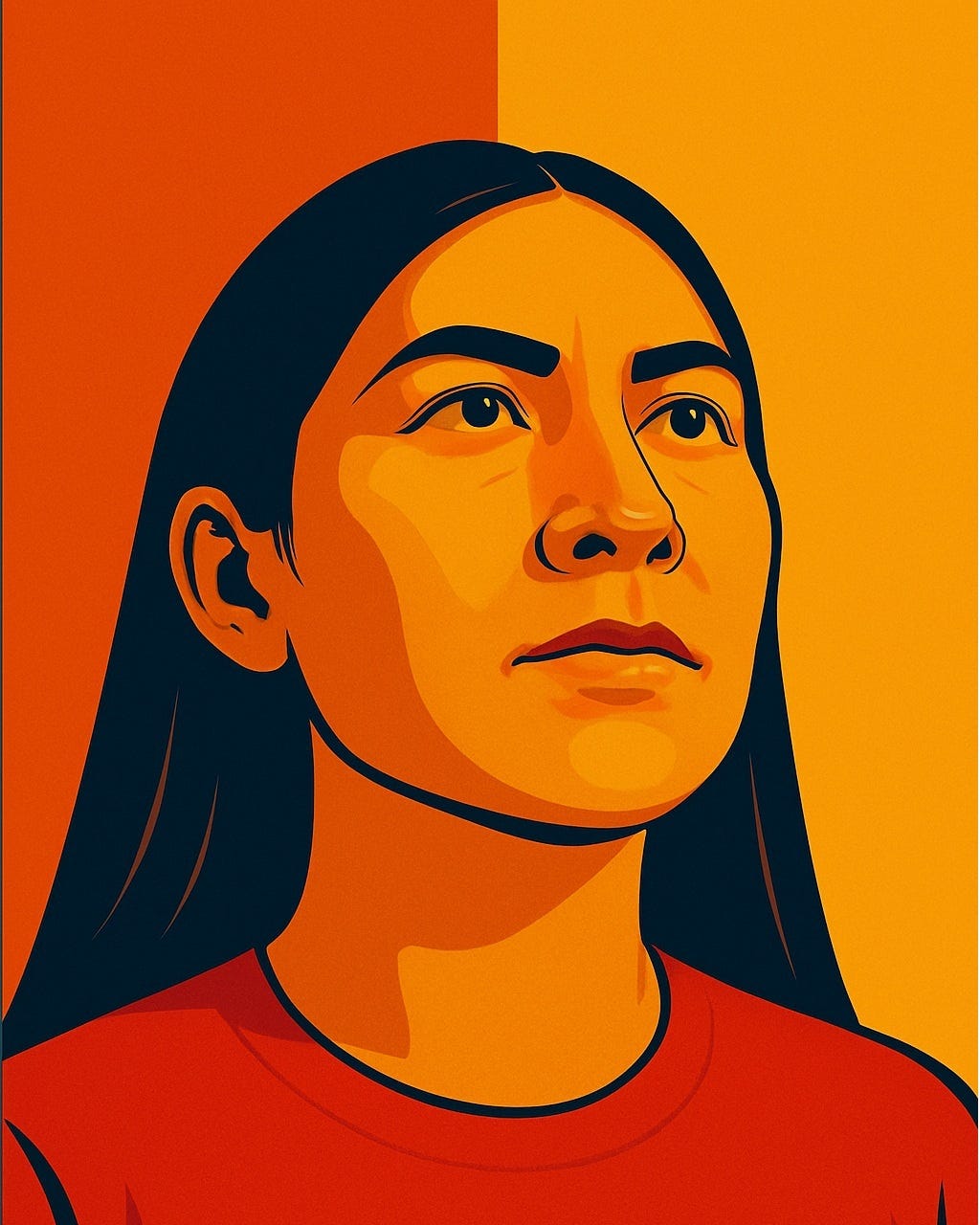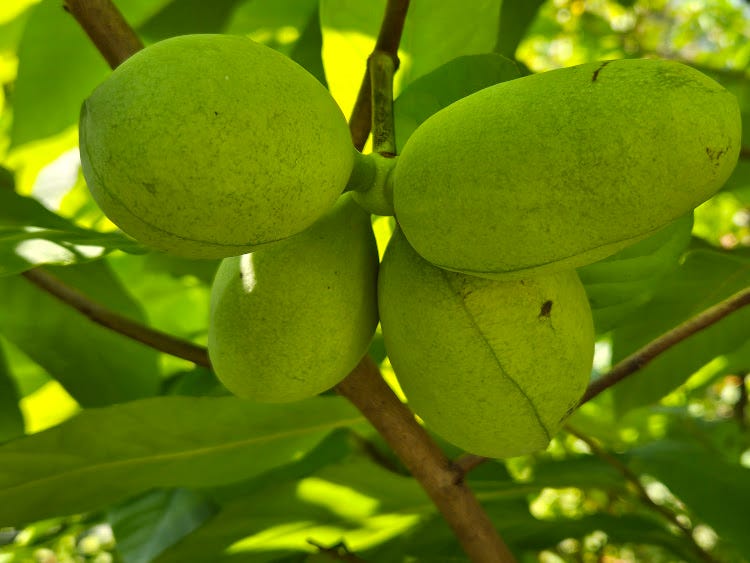This is the kind of essay I never write — a personal essay. And a photo essay. A quick meditation on the remote.
Someone personal to my life is currently taking a personal essay writing class, and so it would seem one thing affects the other.
There's a brick in my head at the moment that seems to clear only as I write this brief little thing — like a poem lifting off the top of my mind.
And as it turns out, this post can’t help but morph into the broad literary and political.
This is not a poem, I don’t suppose, not remotely.
I've always lived remote, more or less. I don't know why. Born that way, I guess. Raised with no neighbors on a defunct timber and sheep farm in one of the two least populated counties in Pennsylvania — a sole traffic light in the region, let alone in the county.
Far more deer than people — something like 3 to 1 before hunting season, 2 to 1 after.
The wild herds love flowers and gardens. They bring the remote close. Too close. And so the etymology of “garden” is “enclosure.” To fend off the too intimate remote.
After high school, a kind of carnivorous garden in purgatory, I left for college to the more-or-less remote center of the state, which was also where after graduating I lived alone and worked for a couple years.
Then grad school and teaching in a small town in central Texas — San Marcos.
Then another teaching job for half a decade in one of the poorest counties in the nation in more-or-less remote South Texas — Starr County and Rio Grande City.
And this after teaching briefly on the remote Navajo Nation. And working briefly as the sole hire of an independent political party in central Arkansas — The New Party.
I never had internet or email until after grad school. Looking back it seems unfathomably remote.
I never owned a TV until my thirties when I got a small screen for our child in the 2000s. Living without TV felt wonderfully remote.
Today we rarely watch it still, except for what passes as TV on laptop where you can access the stories of the times, and other times, and wholly imaginary times — including video series of odd variety.
From Texas I moved back to Appalachia — and mainly worked remote, often not leaving the house and surrounds for weeks, and sometimes then only to buy fifty pound bags of birdseed for a couple feeders. The birds arrive every day but mainly live remote.
I help maintain the defunct farm that my family carved out of forest 200 years ago and never abandoned — each generation marginally working the remote land as best they could, as best they can. A fitful, sometimes desperate, team effort through the 1800s, 1900s, and 2000s.
Each generation leaves behind — or is it really ahead? — a modest permanent mark that follows the the transitory work — a barn, a pond, an orchard, a pine grove, perennial garden beds, stone walls, a brick walk, fields fallow and productive, forest restored and preserved. Each of these elements engages time, fights entropy. Some elements thrive, some hang on remote from their original moment of creation.
The material world stops time, in a sense, and extends it. Remote lifetimes on farm can be glimpsed and re-glimpsed in the blink of an eye, in the motion of a hand or foot.
In the old farmhouse I walk on the same steps, floorboards, and porches that my parents did, and my grandparents, and my great grandparents, and my great-great grandparents, and my great-great-great grandparents, and my son and wife, and myself over decades, and many other relatives and friends who live and visit there — through the span of three very different centuries.
Successive generations climb up the same wood stairs toward sky and attic and climb down the same stone steps into Earth and root cellar. Generations from three centuries walk on the same doorsill, the threshold nearly worn all the way through to floor, more than a century and a half beyond original construction.
Remote. Sometimes remote is the nearest thing to life — the closest thing to day.
Despite being raised a mere three hours from the largest urban population in the United States, I’ve been to New York City only twice, both times recently, at about fifty years of age, first for, of all things, a cross country race in a big park in the Bronx.
Then for an indoor track meet at the Armory.
That said, I’ve travelled to nearly ever state and many cities in the nation, mainly on purpose, mostly by brute bus and car, to get to know the country, its peoples, the continent. Also to a few countries briefly on the cheap, not excluding America’s would-be containment countries, Canada and Mexico. It can seem remote, all of it everywhere, sometimes even when you stand there in person in awe and appreciation.
Some days living remote, life is mundane, and you need to save the cat.
Other days, you fight the powers that be.
Some days, you grow, research, sell, and show.
Other days, you write of Sabia Perez and the Revolution — and a million other things.
Family and friends and allies keep you connected and connecting. “Only connect.”
And the internet, incredibly remote, yet impossibly immediate, brings you instantaneous to the world, the whole world it seems. And vice versa.
I’m happy to live remote from any cameras that might cast personal interest my way. Here’s a rare one. It’s remote. Just ocean and rocks. It almost looks photoshopped. Like, bad photoshop. It might as well be. Almost.
You take on one thing after the other, you can, when you live remote — country living, country growing, revolutionary writing, communal knowing, social and political making.
Fortunately pawpaw trees are not remote — Appalachia’s own — North America’s largest (and tastiest) edible tree fruit.
It’s both the end of the world and the source of all things — to live remote. It’s both the seed and harvest. The sale and the purchase. The talk and the listen. Story and analysis. Earth and idea.
What’s immediate is remote. What’s remote, immediate. It can be.
Nothing might be more remote than a particular city or desert, sea or mountain. Or more intimate.
Can the remote be political and meaningful? What if you make it immediate?
Like, say, an election in New York City.
Let’s ruin this personal photo essay by considering the recent New York City election — the Democratic primary for mayor, in which progressive (so-called socialist) Zohran Mamdani defeated death cult plutocrat Andrew Cuomo.
This is the result that NYC needed. Otherwise, the city would be viewed as one of the most brainwashed and conquered places in the world.
Success, by a few percentage points.
Vanessa Ogle seemingly on point in The Nation — “Zohran Mamdani Won the Internet”:
In many elections, social media doesn’t always translate into actual electoral victories. But Mamdani’s win is prescient and emblematic of a new era where the Internet not only represents reality but can predict it. For months, Mamdani supporters have demanded a win and it has finally materialized.
Social media helped produce Mamdani’s great get-out-the-vote, foot-to-pavement, face-to-face ground game. And social media and the internet were also and otherwise a big part of the “ground game” itself.
Was Bernie Sanders remote from the election? He and Alexandria Ocasio-Cortez endorsed Mamdani, unlike most other Democrats.
Amazing though, how often the Bernie effect is vaporized from existence, as here where NYC journalist and novelist Ross Barkan gets a bit homeboyish with excitement — “When Zohran Won”:
For the Democratic Socialists of America, this is a triumph beyond their wildest dreams. AOC won in a single House district. Sanders never won a presidential race. And Mamdani, unlike both of them, is cadre DSA, a proud member who has done a tremendous amount of organizing within the socialist ranks and counted himself as a leader of the socialists in Albany. This victory belongs to them above anyone else.
This greatly understates the massive earthquake and nature of Bernie Sanders’ 2016 primary campaign, 9 full years ago, in comparison to Mamdani’s also great achievement. Bernie’s campaigns and huge primary wins, and close calls, continue to powerfully affect many subsequent elections, including this one. Bernie did far more than win a single big city in a primary, and he won far more than Mamdani’s approximate half million votes.
One could even say that New York City is finally catching up to the civilized world, by way of the Bernie effect. And that the city sure took its time getting there.
When you come from the country and meet people from the city for the first time, you can think, Whoa, there’s a lot of city hicks.
Of course, they may think the same about you. With good reason.
And there’s a lot of supremacists in the countryside. Many who think they know things that they don’t.
So we should try not to overlook or mistake either, city or country.
Bernie won 23 states — and he won over 13 million votes in the 2016 Democratic Presidential primary. And he did it against the fierce and total opposition of the entire national Democratic establishment. Bernie defended the people of the entire country and damn near won it all. Twice.
And he did it while running explicitly as a Democratic Socialist — 9 years ago — on a platform promising universal health care and free public college and higher wages and much more — far beyond Mamdani’s platform, necessarily so.
This dwarfs what Mamdani promised, achieved, and faced in the single city of New York, albeit the largest city in the country. Not to mention Bernie’s wins and campaigns broke the ideological ice and paved much of the strategic way for Mamdani — as with Alexandria Ocasio-Cortez and other leftists, in many ways.
A great result for Mamdani, and the city and country, which portends well for the future, though in reality it’s an aftershock to the much more massive earthquake that occurred nearly a full decade ago — which itself grew out of the social volcano of Occupy Wall Street a half decade earlier (thus spanning most of the smart phone internet age) — with many aftershocks that continue to this day and beyond.
So now NYC reaps the rewards and fends off the death cult.
Would-be revolutionaries are cropping up everywhere.
As the revolution grows less remote.
Most Revolutionary — Contents
Acting President Alecta O’Roura-Chavez assumes power and ushers in the revolution.





















